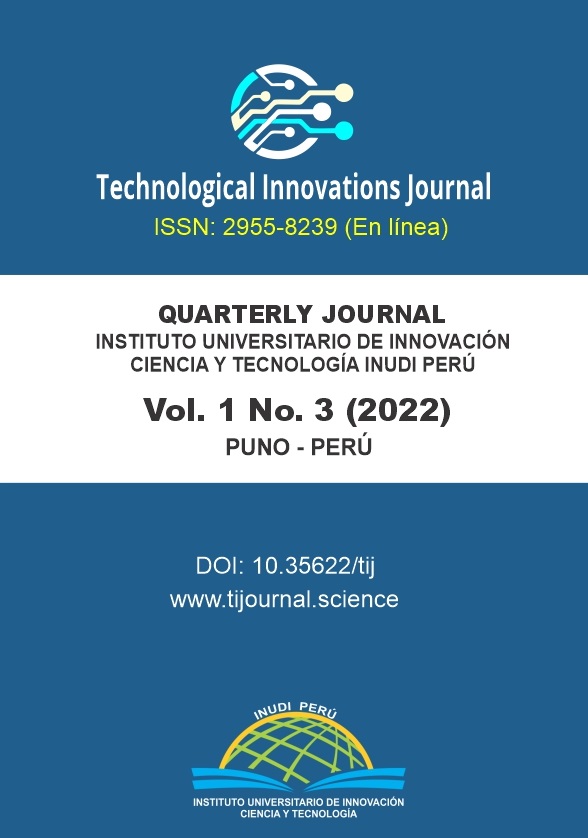Development of mathematical logical reasoning in initial teacher training
DOI:
https://doi.org/10.35622/j.ti.2022.03.005Keywords:
ability, arithmetic reasoning, geometric reasoning, mathematical logical reasoningAbstract
The purpose of the research was to examine the development of the mathematical logical reasoning of the students of the first cycle of the Professional School of Initial Education of the National University of the Altiplano (Peru, period 2020). The research approach is quantitative, the type of research is descriptive, the design being transectional descriptive; the study sample consisted of 44 female students, selected by non-probabilistic sampling. The instrument used was the mathematical logical reasoning test, which consists of 20 items and was applied in a single act to the research subjects. The result achieved shows that 72% of them were able to conveniently develop mathematical logical reasoning, which evidenced that the use of specific skills and abilities allowed them to identify, relate, and adequately operate the necessary bases in solving problem situations. It is concluded that, based on the findings found, the majority of those evaluated managed to develop mathematical logical reasoning expressed in the arithmetic, algebraic, geometric and logical dimensions.
References
Alva, M. (2017). Relación entre el nivel de inteligencia lógico matemática y el rendimiento académico en los estudiantes de la asignatura de Desarrollo del Pensamiento Matemático del primer ciclo de la Facultad de Educación de la UNMSM durante el semestre académico 2016 – I.
Carrasco, S. (2006). Metodología de la investigación (E. S. Marcos (ed.).
Cofre, A. y Tapia, L. (2003). Cómo desarrollar el razonamiento lógico matemático. Ed. Universitaria S.A.
Díaz Rubio, A. D. P. (2020). Razonamiento lógico matemático en los estudiantes de tercer y cuarto grado.
Hernández, R. & Fernandez, C. & Baptista, P. (2010). Metodología de la investigación (S. de C. McGraw-Hill/Interamericana Editores (ed.)).
Múnch, Lourdes y Ángeles, E. (2017). Métodos y técnicas de investigación (Trillas).
Orozco Moret, C., & Díaz, M. Á. (2009). Formación del Razonamiento Lógico Matemático. Aleph Zero, 1, 1–14.
Peña, R. y Basilio, H. y Peña, P. (2017). Inteligencia lógico matemático y rendimiento académico en estudiantes de la Facultad Ingeniería Civil – UNCP Yupay allikay yaćhayniyu yaćhaykap atipayninwan yaćchapakukunap Civil Inhinirya Facultadinninćhu - UNCP Mathematical logical intelligence and acad. Horizonte de La Ciencia, 7(13), 139–148. DOI: https://doi.org/10.26490/uncp.horizonteciencia.2017.13.360
Quintero, Liliana y Suárez, Yuly y García, Germán y Vanegas, J. (2012). Niveles de pensamiento y resolución de problemas matemáticos en los estudiantes del programa psicología de una Universidad Pública de Santa Marta (Magdalena). Revista de La Facultad de Ciencias de La Salud, 9, 9.
Ramirez, P., Hernández, C., & Prada, R. (2018). Elementos asociados al nivel de desarrollo del pensamiento lógico matemático en la formación inicial de docentes. 39, 10. http://www.revistaespacios.com/a18v39n49/a18v39n49p11.pdf
Rodríguez Pérez, F., & Ramírez, M. A. (2015). Desarrollo de habilidades matemáticas en estudiantes que ingresan a la educación superior. Inventum, 10(18), 29–36. https://doi.org/10.26620/uniminuto.inventum.10.18.2015.29-36 DOI: https://doi.org/10.26620/uniminuto.inventum.10.18.2015.29-36
Ruiz, M. y George, J. (2014). Dificultades y retos en la formación inicial de profesores de telesecundaria. https://www.pag.org.mx/index.php/PAG/article/view/46
Torres, A. (2007). Educación matemática y desarrollo del pensamiento matemático (E. Rubiños (ed.)).
Vilca, E. (2018). Razonamiento lógico matemático y capacidades matemáticas en estudiantes de 5o secundaria de la IE 5150 - Ventanilla, 2018. In Universidad César Vallejo.
Published
Issue
Section
License
Copyright (c) 2022 Alfredo Castro (Autor/a)

This work is licensed under a Creative Commons Attribution 4.0 International License.











